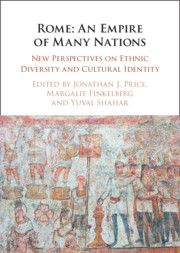Book contents
- Rome: An Empire of Many Nations
- Reviews
- Rome: An Empire of Many Nations
- Copyright page
- Contents
- Figures
- Contributors
- Acknowledgments
- Abbreviations
- Introduction
- Part I Ethnicity and Identity in the Roman Empire
- 1 From Rome to Constantinople
- 2 The Imperial Senate
- 3 Ethnic Types and Stereotypes in Ancient Latin Idioms
- 4 Keti, Son of Maswalat
- Part II Culture and Identity in the Roman Empire
- Part III Ethnicity and Identity in the Roman Empire
- Part IV Iudaea/Palaestina
- Bibliography
- General Index
- Index Locorum
2 - The Imperial Senate
Center of a Multinational Imperium
from Part I - Ethnicity and Identity in the Roman Empire
- Rome: An Empire of Many Nations
- Reviews
- Rome: An Empire of Many Nations
- Copyright page
- Contents
- Figures
- Contributors
- Acknowledgments
- Abbreviations
- Introduction
- Part I Ethnicity and Identity in the Roman Empire
- 1 From Rome to Constantinople
- 2 The Imperial Senate
- 3 Ethnic Types and Stereotypes in Ancient Latin Idioms
- 4 Keti, Son of Maswalat
- Part II Culture and Identity in the Roman Empire
- Part III Ethnicity and Identity in the Roman Empire
- Part IV Iudaea/Palaestina
- Bibliography
- General Index
- Index Locorum
Summary
The reasons for the long stability and the centuries-long, uncontested Roman rule over the entire Mediterranean basin and bordering territories are a perennial topic of discussion. In that respect, the willingness of Rome to grant citizenship to former subjects is an essential chapter to be written in this history. Yet it is less often asked to what extent the induction of individuals from the subject states and peoples into the Roman Senate contributed to that stability. The positive and negative consequences of this phenomenon are discussed in this chapter.
- Type
- Chapter
- Information
- Rome: An Empire of Many NationsNew Perspectives on Ethnic Diversity and Cultural Identity, pp. 29 - 41Publisher: Cambridge University PressPrint publication year: 2021

